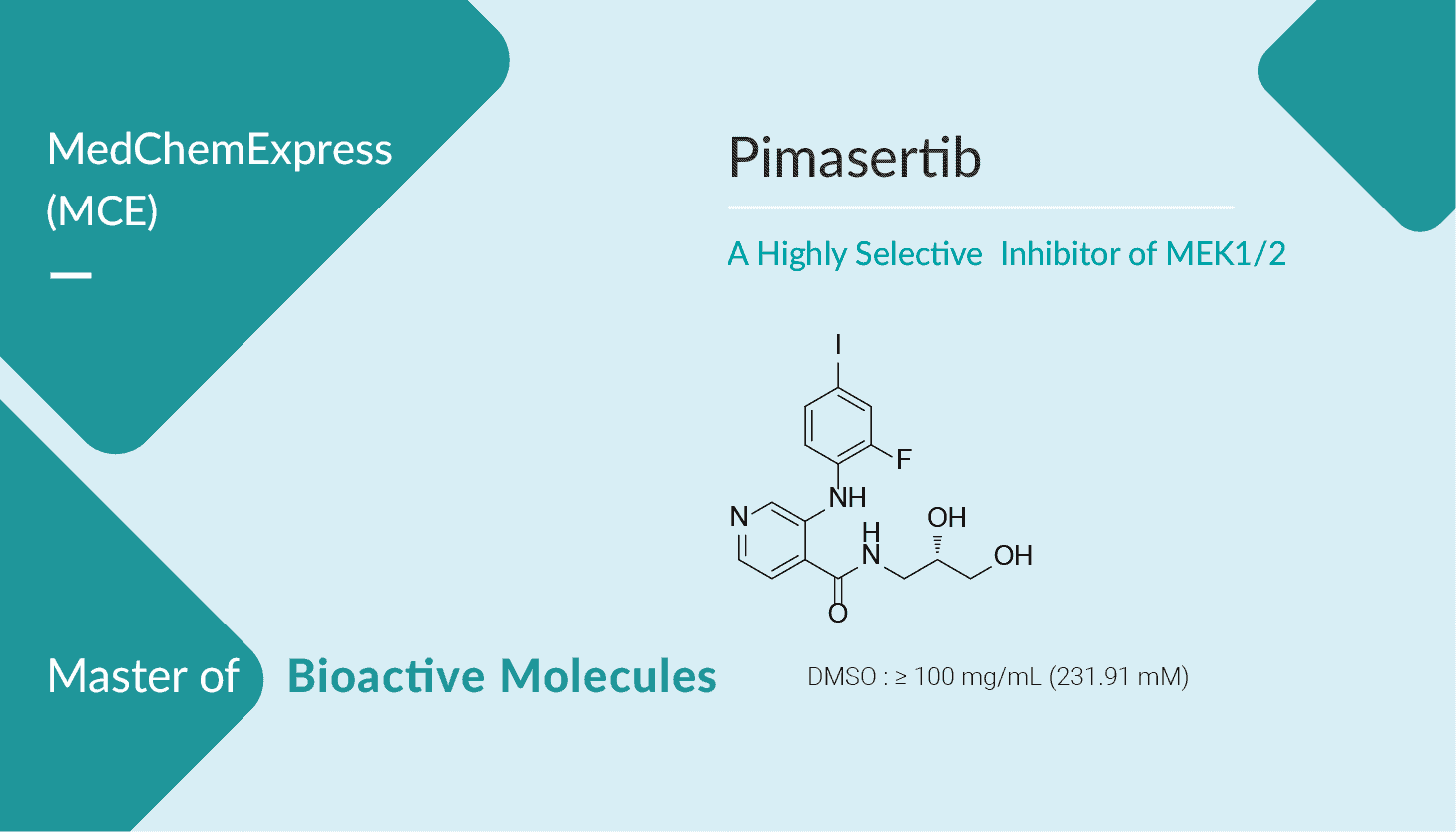The RAS/RAF/MEK/MAPK and the PTEN/PI3K/AKT/mTOR pathways are key regulators of proliferation and survival in human cancer cells. RAF is a serine/threonine kinase that activates downstream signals in response to activated GTP-bound RAS by phosphorylating MEK (MEK1 and MEK2). They in turn phosphorylate and activate MAPK (or ERK1 and ERK2). ERK kinases phosphorylate some cellular substrates with key roles in cell proliferation and survival. PI3Ks are a family of lipid kinases that propagate intracellular signaling cascades regulating a wide range of cellular processes. The PI3K/AKT signaling cascade is critical in cancer as it promotes cell survival and growth. Direct inhibition of MEK is a promising strategy in the development of cancer therapeutics to control tumor growth that is dependent on aberrant MEK pathway signaling as it occurs in a large fraction of human cancer types. Pimasertib is a highly selective, potent, ATP non-competitive allosteric inhibitor of MEK1/2.
Pimasertib is a highly selective, ATP non-competitive allosteric orally available MEK1/2 inhibitor.
 First, Pimasertib inhibits in a panel of four human CRC (COLO205, HT29, LOVO, HCT15) and four NSCLC (H1299, A549, H460, H1975) cell lines. Those cells have different mutation profiles in KRAS, NRAS, BRAF, PI3KCA, and EGFR genes. In addition, Pimasertib shows a wide range of in vitro sensitivity to the growth inhibitory effects. The IC50 is 1000-fold less in sensitive cancer cell lines as compared to resistant cancer cell lines. Pimasertib has the potential for a number of solid and hematological cancers. Finally, in nude mice bearing established HCT15 and H1975 subcutaneous tumor xenografts, the combined treatment with pimasertib and BEZ235 or with sorafenib caused significant tumor growth delays. It also increases in mice survival as compared to single agent treatment.
First, Pimasertib inhibits in a panel of four human CRC (COLO205, HT29, LOVO, HCT15) and four NSCLC (H1299, A549, H460, H1975) cell lines. Those cells have different mutation profiles in KRAS, NRAS, BRAF, PI3KCA, and EGFR genes. In addition, Pimasertib shows a wide range of in vitro sensitivity to the growth inhibitory effects. The IC50 is 1000-fold less in sensitive cancer cell lines as compared to resistant cancer cell lines. Pimasertib has the potential for a number of solid and hematological cancers. Finally, in nude mice bearing established HCT15 and H1975 subcutaneous tumor xenografts, the combined treatment with pimasertib and BEZ235 or with sorafenib caused significant tumor growth delays. It also increases in mice survival as compared to single agent treatment.
In summary, Pimasertib (AS703026) is a highly selective, potent, ATP non-competitive allosteric inhibitor of MEK1/2 with antitumor activities. In addition, Pimasertib in combination with PI3K/mTOR inhibitors or with multi-targeted kinase inhibitors in pimasertib-resistant human lung and colorectal cancer cells.
Reference:
Martinelli E, et al. Int J Cancer. 2013;133(9):2089-2101.